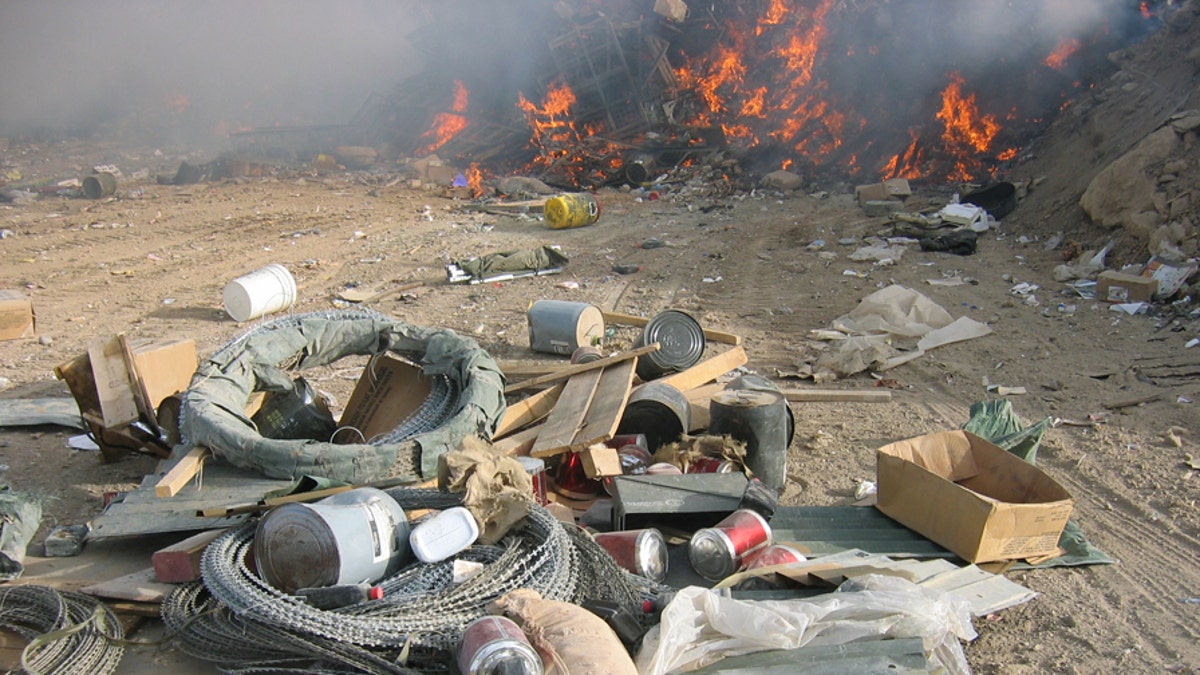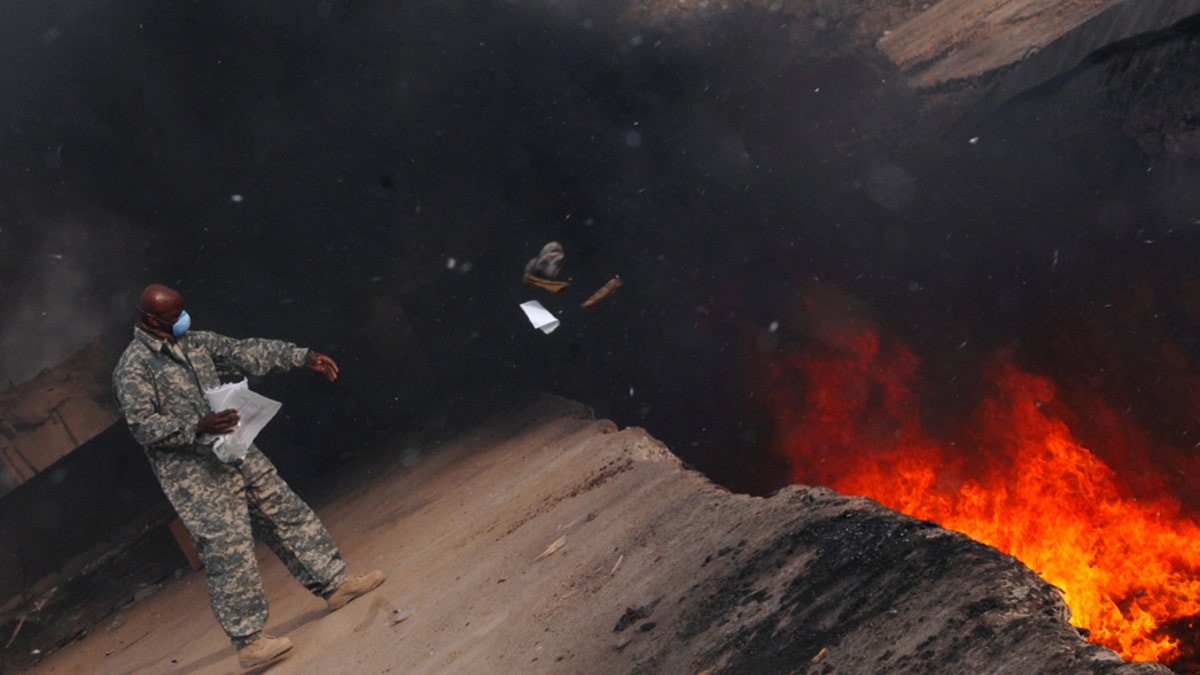Jon Stewart pushes bill to help veterans exposed to burn pits
Comedian and veteran advocate Jon Stewart and Captain Rafael Barbosa on veteran fighting cancer after burn pit exposure.
For the millions of veterans sickened from their exposure to burn pits, their time for relief has finally come with the approval of a new bill to provide much-needed treatment.
The Senate voted 84-14 on Thursday in favor of the Sergeant First Class Heath Robinson Honoring Our Promise to Address Comprehensive Toxics (PACT) Act of 2022. The bill, which was passed with a majority vote, represents the most comprehensive veteran health care reform to date, establishing a presumptive service connection for veterans made gravely ill after inhaling toxic fumes that hung over their bases overseas, including in Iraq and Afghanistan.
"This bill is personal due to it being named after my late husband, SFC Heath Robinson, however it represents so many veterans across our nation who have succumbed to their burnpit exposures," Robinson's widow, Danielle, told Fox News. "Today is my daughter Brielle's ninth birthday. She was born on Father's Day. We feel this bill passing today is Heath's way of telling us he is proud of us for seeing this bill through."
She continued, "He was a fighter and soldier to the very last breaths he took and he will now always be remembered as a hero. His life was meant for him to impact so many people and now it will help so many of his brothers and sisters now and in the future."
The Honoring Our PACT Act’s passage is a culmination of a decades-long fight by veterans and their families for the U.S. government to provide proper treatment for the severe illnesses any service members developed after they returned home from battle.
"You know, this is one of those days where you feel like all the hard work and the blood, sweat and tears that they all put in over all those years have finally paid off," comedian and activist, Jon Stewart, said during a press conference on Capitol Hill after the final vote. "The real work of administrating this bill begins. This doesn't solve anybody's problem. This just removes the burden from their fight that should have been there in the first place."
Jon Feal, who in addition to lobbying with Stewart on behalf of veterans, worked on getting Washington to pass the 9/11 Victims Compensation Fund, said the Honoring Our PACT Act will ensure that service members will finally get proper treatment for their illnesses. "This is truly a never leaving anybody behind and this $278 billion lifesaving piece of legislation is going to help to bring to 3.5 million veterans who are possibly affected by the burn pits. This is historic."
Stewart first became involved with lobbying efforts after meeting with Rosie Torres, who started the advocacy group Burn Pits 360 over a decade ago with her husband, LeRoy Torres, after he returned from service during the Iraq War with a myriad of health issues due to his prolonged exposure to burn pits on his base in Balad.
"Today, the Senate voted to pass one of the most historic and monumental pieces of legislation that we helped create. My family has lost 13 years away from our children. We’ve missed birthdays, movie nights, school field trips, and priceless moments we will never get back." Rosie Torres said to Fox News. "Today is not only about legislation being passed, it is about closure and honoring the living and the fallen."
"Our leaders have finally acknowledged these injuries and disease as a direct result of Armed conflict caused by an instrumentality of war."
The Investigative Unit at Fox News has reported extensively on veterans made sick from their exposure to burn pits. Many service members said the pits were a crude method of incineration in which every piece of waste was burned, including plastics, batteries, appliances, medicine, dead animals and even human waste. The items were often set ablaze using jet fuel as the accelerant.
The pits were used to burn more than 1,000 different chemical compounds day and night. Most service members breathed in toxic fumes with no protection.

Burn pits, like this one at FOB Marez, were originally considered a temporary measure to get rid of huge amounts of waste generated at bases. The array of material sent to the pits is said to have included plastics, batteries, metals, appliances, medicine, dead animals and even human waste. (John Nelson)
The namesake of the Honoring Our PACT Act is just one of many made fatally sick from their exposure.
Heath Robinson was believed to have contracted a rare autoimmune disorder, mucus membrane pemphigoid, after he was exposed to burn pits during a 13-month tour in Iraq while serving with the Ohio National Guard. While Robinson received assistance while still in the military, his wife, Danielle Robinson and her mother, Susan Zeier, have been longtime advocates for other veterans.
Stewart referred to their relentless lobbying of the Honoring our PACT Act during Thursday’s press conference.
"You're tenacity personified and the way you've carried the banner for your family and your loved ones and in their pain," Stewart said directly to Zeier while holding back tears at Thursday’s press conference. "That's the thing, you know. Advocating for causes is a very it's a lovely thing to do but to do that in your grief when you know that it's not going to help your loved one, But that's not what matters to you. It’s that no one goes through what you went through. And that's just the epitome of grace."
The Honoring Our PACT Act is a piece of major legislation that will help the more than three million veterans suffering from rare cancers, lung disease and other respiratory illnesses. With the current law in place, veterans who have an illness or disability due to burn pit exposure must, in most cases, establish a direct service connection to be eligible for Department of Veterans Affairs benefits – a task that has often been proven difficult to achieve.
BURN-PIT BILL GIVES VETERANS HEALTH CARE TO OVERCOME ONGOING CRISIS

Thousands of U.S. military personnel who served on bases in Iraq and Afghanistan were exposed to the dense black smoke.
The new law eliminates the burden of proof for veterans, with the establishment a presumptive service connection to their illnesses. Service members would only need to submit proof of deployment to one of the countries listed in the bill during the Gulf War or the Global War on Terror.
"Our service members and their families give everything for our country. And as a nation we promise to care for them when they come home. At last, we are honoring that promise and paying the price we owe them for our freedoms, our values, and our safety." Senator Kirsten Gillibrand (D-NY), one of the key sponsors of the bill, said in a statement. "Today’s Senate passage of the Sergeant First Class Heath Robinson Honoring Our PACT Act is an enormous victory for the service members, veterans, and their families who have been fighting for years to get the health care and benefits they have earned."
With the Senate’s approval, the bill will now go back to the House, which already had voted in favor back in March, before going to President Biden to sign it into law.
"When young men and women make the choice to dedicate their lives to serving our nation, they rightly expect their country will take care of them when they return home," Sen. Marco Rubio (R-FL), a key sponsor of the bill, said in a statement to Fox News. "It took far too long, but we never gave up on our veterans because they have never given up on our country. I hope the House will quickly pass this bill, so President Biden can finally sign it into law."
During this year’s State of The Union address, President Biden mentioned his support for new legislation as well as his son Beau, who he believes may have become ill from exposure after returning from military service in 2001.
BIDEN SIGNS TWO NEW BILLS INTO LAW THAT AIM TO HELP BURN PIT VETERANS
"They [service members] come home many of the fittest and best-trained warriors in the world, never the same. Headaches, numbness, dizziness, a cancer that would put them in a flag-draped coffin," Biden said during the March address. "One of those soldiers was my son, Maj. Beau Biden. I don't know for sure if the burn pit that he lived near, that his hooch [barracks] was there in Iraq, and before that Kosovo, is the cause of his brain cancer and the disease of so many other troops. But I am committed to find out everything we can."
While the Senate's passage of the Honoring our PACT Act is a major milestone, advocates say there’s much work to be done to ensure that all veterans made ill from their burn pit exposure receive the help they deserve.
"The grass-roots activism is over. But now they got to take this bill to, which is in infant stages and watch it mature because this bill is going to help a lot of people," Feal said. "These VSOs [Veteran Service Organizations] are going to have to look over this bill to make sure it’s being run right, and men and women are being taken care at the VA. And that's when the real work starts. That's when you roll up your sleeves."
CLICK HERE TO DOWNLOAD THE FOX NEWS APP
Rosie Torres says that today’s vote has provided a sense of relief after fighting for the rights of veterans for so long.
"We walked the halls of Congress for 13 years, many days feeling torn down by the bureaucratic inertia and a system of 'delay and deny,' but we never gave up."















































